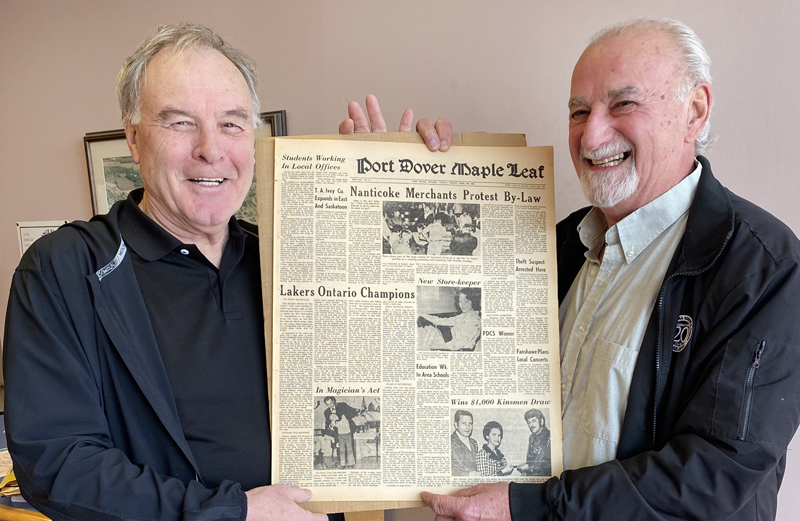Everyone invited to the team’s 50th anniversary reunion on Thursday, May 15, at 7 p.m. in the Terrace Room.
By Jacob Fehr
FIFTY years ago, on April 14, 1975, the Port Dover Lakers won the Ontario Hockey Association’s (OHA) Intermediate B championship after besting the Paris 29ers 5–4 to take the season’s final series in six games. The victory brought Port Dover its second-ever OHA championship.
To celebrate the 50th anniversary of their provincial championship win, some of the team’s players are hosting a reunion on Thursday, May 15, at 7 p.m. in the Erie Beach Hotel’s Terrace Room.
Former Lakers forwards Charlie Luke and Roy Powell said everyone is invited to come and reminisce or learn about the team’s success.
“We would welcome all former players, executives, fans, and anybody in general,” Mr. Luke said. He and Mr. Powell are excited to catch up and revive camaraderie with peers they haven’t seen in years.
“A lot has changed in Port Dover, a lot of the landscape, but the people haven’t,” he said. “It’s just going to be a great time to sit and talk about it.”
Mr. Luke attended Port Dover Composite School and played Junior and Intermediate hockey with local teams. He said he was 22 and in his second year of Intermediate play when the Lakers won their championship. According to the Maple Leaf’s archives, during the 1974–75 season, he led the league in goals with 48.
Mr. Powell said he played hockey from ages eight to 58 before bone spurs made him “hang it up.” In the 1964–65 season, he won the OHA Junior C championship with the Simcoe Blades hockey team. He was 27 when the Lakers became champs.
“Roy was kind of the veteran on the team,” Mr. Luke said.
Mr. Powell agreed, adding, “I was the first player to sign a contract for the new Intermediate B league.” He said he competed at that level locally for 14 years before moving on to leagues for older players.
Reflecting on their win, Mr. Luke said some executives with the 29ers told him Paris was favoured to win their series by three-to-one odds. Their opponents “put together a talented team,” perhaps even better than the Lakers, but ultimately, it didn’t matter.
The Lakers’ goalie, Rob Cuerrier, was only able to participate in a few playoff games, so they leaned on retired veteran Stan McMillan and called up Eddie Phillips from the Port Dover Sailors Junior D team to fill in. The Lakers’ captain, Don Dixon, left game six of the finals with a separated shoulder after a Paris player collided with him.
But none of that stopped them. The Lakers still persevered.
“We dug a little deeper,” Mr. Powell said. “We had to.”
Much has changed in hockey over the past 50 years
As Mr. Luke pointed out, much has changed since the Lakers were crowned provincial champs, including some aspects of hockey. The two experienced former players shared their thoughts on the game’s evolution over 50 years.
“The biggest change is the speed. These guys can skate faster backwards than I could skate forward. These guys are fast,” Mr. Luke said.
“And the other thing is the guys are so much more protected,” he added, highlighting how players today have higher-quality gear and more safety equipment than he and his peers had.
Both said they think year-round hockey programming helps players improve more consistently. They joked that in their day, it was common for players to vomit at their first practice of the season because they were out of shape.
Today, many players take fitness, exercise, and nutrition seriously all year. It helps that they have more knowledge and tools available to them than players had in the ’70s.
Mr. Powell mentioned that hockey coaches today are more educated and trained as coaches than in the past, which helps them get more out of players and teams. He thinks improved coaching creates more opportunities for players to develop, especially those not compelled to play by their parents.
“The ones that aren’t being pushed that way are getting a lot more ice time, the coaches are a lot better now… and the kids are coming into that,” he said.
As coaches have changed, practices have, too. Mr. Powell said it was typical to have one practice session a week where they might drill a play or two, but “when the game came along, it didn’t happen.” Nowadays, players practice more often and usually learn many plays for specific situations.
“The kids that excel in education, I find that they’re the better hockey players,” he said. He believes they improve by learning from their coaches and experience.
Another way the game has changed is the introduction of more technology, which Mr. Luke said he is “really amazed” by.
“The coaches, they’re watching video tape of games. They’re doing analysis of the players, the plays, how they can do better. There are more ways to be better.”
He also thinks “there’s so much more opportunity,” including “more benefits and more financial help,” for players to capitalize on today. In the ’70s, he said, one’s choices were hockey, school, or work. Now, players are expected to find a balance between them.
“There’s more opportunity to have it both ways.”
One change the pair were enthusiastic about is how the game has grown for women.
“I am so pleased to see girls playing hockey today,” Mr. Luke said. He feels it’s unfortunate that young women of past generations, such as his daughters, didn’t have the same opportunities to play as their male counterparts. It makes him happy to see his nieces play today.
He and Mr. Powell like to watch Professional Women’s Hockey League (PWHL) games. The latter even said he prefers PWHL games over NHL games.
Reflecting on their time as members of a championship-winning team, Mr. Powell and Mr. Luke said the experience impacted them. But it was the team, not winning, that enriched their lives.
“When I started playing hockey when I was eight, I was just psyched about the game,” Mr. Powell said.
He didn’t care for school, leaving for full-time employment in Grade 10. As he put it, “I think sports was the only thing on my mind.”
So it was through sports that he developed a work ethic, learned about life, improved his play and himself, and came into his own.
He and Mr. Luke shared that they learned a lot from the older players on their hockey teams, who were like mentors to them. However, for all the guidance their senior peers could give on the ice, he said they learned the most from them on the bench, in dressing rooms, and on the street. The life lessons they gleaned helped them grow.
“I think it helped me physically and it also helped me mentally,” Mr. Powell said.
“I think hockey was my relief on life.”
Mr. Luke talked about how, like school, hockey was another way for youth to be involved in the community. That helped him become comfortable in Port Dover when the area was unfamiliar to him.
When he joined the local Junior hockey team, he was 15 years old and played with and against much older players, which quickly helped him improve.
“[That] brought my level of play up,” he said.
He attributes his growth as a player to the mentorship of his teammates over the years.
“You can’t develop as I think I did as a player without that support and people encouraging [you],” he said.
“We don’t realize at the time how important it is to our social development.”
As part of that development, he matured and learned to work with a team, a skill he said has served him well. With the Port Dover Lakers, he was surrounded by people who bought into “a team approach to succeed at something.”
“It’s one thing to succeed, but there’s nothing like succeeding with a team,” he said.
Each Lakers player brought their skills to the group, “and you learned [things] from that,” such as “what your role was.” Everybody worked hard to bring their best for each game.
“There was nobody on the team that was better than the rest—we were all important,” he said.
If you ask him and Mr. Powell, Paris may have had superior players, but Port Dover had the better team. That’s why they bested their favoured opponents in six games. And that’s why being a
Laker, not winning the championship, shaped their lives.
“It just made me a better person. Winning the all-Ontario was the icing on the cake, but it just made me a better person. I just know it did.”
—
Originally published April 16, 2025



